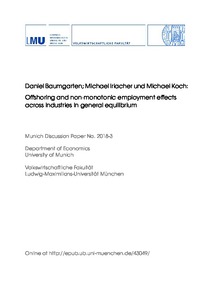Offshoring and non-monotonic employment effects across industries in general equilibrium
"We address the mismatch between existing theoretical models and standard empirical practice in the analysis of the labor market effects of offshoring. While theory focuses on one-sector or two-sector models, empirical studies exploit variation in offshoring across a large number of industries,...
| Main Authors: | , , |
|---|---|
| Institution: | ETUI-European Trade Union Institute |
| Format: | TEXT |
| Language: | English |
| Published: |
Munich
2018
Ludwig-Maximilians-Universität München |
| Subjects: | |
| Online Access: | https://www.labourline.org/KENTIKA-19398529124911167019-offshoring-and-non-monotonic-e.htm |
| _version_ | 1771659898208124928 |
|---|---|
| author | Baumgarten, Daniel Irlacher, Michael Koch, Michael |
| author_facet | Baumgarten, Daniel Irlacher, Michael Koch, Michael |
| collection | Library items |
| description | "We address the mismatch between existing theoretical models and standard empirical practice in the analysis of the labor market effects of offshoring. While theory focuses on one-sector or two-sector models, empirical studies exploit variation in offshoring across a large number of industries, typically including a linear offshoring term in the analysis. Thereby, these studies implicitly assume a monotonic relationship and ignore general-equilibrium effects across industries. We analyze the effects of offshoring across a continuum of industries with different shares of offshorable tasks that are linked through labor and capital markets in general oligopolistic equilibrium (GOLE). Our main result is that offshoring generates a hump-shaped pattern of employment changes across industries. While the relocation effect reduces employment in offshoring-intensive industries, labor demand in industries with a high prevalence of domestic production falls because of rising domestic wages and firm exits in general equilibrium. In the empirical part, we test the non-monotonic employment effects of offshoring across industries by focusing on Germany after the fall of the Iron Curtain. We find strong empirical support for the hump shape in the changes of employment across industries with different scopes for offshoring, which is almost entirely due to the extensive margin, underscoring the importance of establishment entry and exit. Finally, we discuss important implications for empirical and theoretical research arising from our study." |
| format | TEXT |
| geographic | Germany |
| id | 19398529124911167019_0e81c15661e245099ed241a5893396f5 |
| institution | ETUI-European Trade Union Institute |
| is_hierarchy_id | 19398529124911167019_0e81c15661e245099ed241a5893396f5 |
| is_hierarchy_title | Offshoring and non-monotonic employment effects across industries in general equilibrium |
| language | English |
| physical | 51 p. Digital |
| publishDate | 2018 |
| publisher | Munich Ludwig-Maximilians-Universität München |
| spellingShingle | Baumgarten, Daniel Irlacher, Michael Koch, Michael relocation of industry employment labour demand Offshoring and non-monotonic employment effects across industries in general equilibrium |
| thumbnail | https://www.labourline.org/Image_prev.jpg?Archive=132595795077 |
| title | Offshoring and non-monotonic employment effects across industries in general equilibrium |
| topic | relocation of industry employment labour demand |
| url | https://www.labourline.org/KENTIKA-19398529124911167019-offshoring-and-non-monotonic-e.htm |

